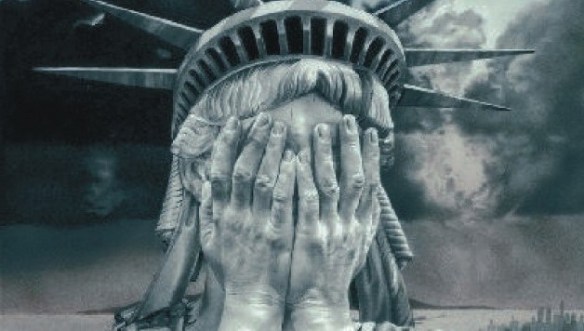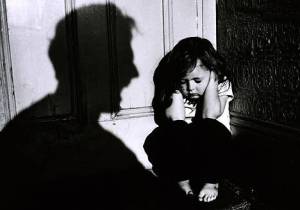
“Ever since he was elected, I can’t sleep, I can’t function, I cry all the time. I can barely work. I want to ignore the news, but it’s always there, HE’s always there, always sucking me in like a black hole, and it’s destroying me.”
“Trump is destroying and dismantling everything near and dear to me. I don’t know how much longer I can go on. I’m back to smoking and drinking heavily because I don’t know what else I can do. It just seems hopeless. He has destroyed the future.”
“Whenever I hear the stories and see the pictures of those poor migrant kids and their heartbroken families, I just want to scream. What kind of society separates families? What kind of society imprisons children who have done nothing wrong? What kind of society makes it a FELONY to leave food and water for hungry, exhausted, and thirsty women and children who have walked thousands of miles to escape from certain death in their home countries? A cruel, heartless, psychopathic society, that’s what. I wish I could leave.”
“I feel like I’m living in a nightmare that I can’t wake up from.”
“This isn’t my country anymore. Women are being treated as second class citizens, or chattel. I feel like my daughters have no future here. We are seriously considering leaving for a country that respects women and girls instead of treating them like the Taliban treats their women.”
“I’m scared every day. The anxiety and grief is relentless.”
I never thought I’d say this, but I’m ashamed to be an American.
*****
These are actual quotes from people reacting to what’s happening in America under Dictator Trump. What struck me about these comments is how eerily reminiscent they are of the sort of comments people who grew up with narcissistic parents or are in abusive relationships make. The dynamics are identical; what America is experiencing is simply narcissistic abuse on a very large scale. The main difference is, it’s a lot easier to go “No Contact” with an abusive family. Unless we are pretty well off financially or have family or close friends in other countries to help us get resettled, most of us can’t just up and leave.
In normal, civilized, democratic societies, politics doesn’t dominate people’s everyday lives. Before Trump, I could ignore the news. It usually bored me. I had other, happier, interests. People in functioning democracies have that luxury, and can focus on their families, friends, jobs, hobbies, educations, and other interests.
In failing states, and in dictatorships, politics dominates peoples’ lives because their very survival hangs on the day to day whims of their often cruel rulers, rulers who rarely make policies that benefit them and are very likely to make policies that outright hurt them.
There are four main ways people normally react to a formerly benign government being taken over by cruel dictatorship or other malevolent regime. I have taken the liberty of borrowing Pete Walker’s “Four F’s” of C-PTSD, because what is happening to Americans is very much akin to C-PTSD and PTSD. Even people who support Trump and his inhumane policies are analogous to the flying monkeys in a narcissistic family. They cope by identifying with the abuser. Some may be suffering from Stockholm Syndrome. Trump’s confidantes and high level enablers, of course, are also flying monkeys (and Trump’s “golden children”) and are probably on the narcissistic or psychopathic spectrum themselves. The rest of us are the scapegoats or “forgotten children.”
So, without further ado, here are the four primary ways people in failing states and impending dictatorships (and abusive families) react to the trauma (and make no mistake, it is trauma):
1. Sell out to the political system (abusive family) and meekly succumb to whatever new laws and restrictions, no matter how draconian and cruel, are forced on them (the Fawn or Fear reaction);
2. Flee to another country (No Contact) if they are able (the Flight reaction);
3. Numb the soul and mind through alcohol or drugs (there’s a reason, besides their highly addictive properties, why the opiates are a huge crisis right now: people are trying to numb their psychic pain). It’s also why alcoholism is so high in certain failed states and dictatorships, such as Russia, Belarus, and Hungary. Some people don’t turn to drugs or alcohol to cope, but are able to just turn off their emotions and feel nothing anymore (Freeze/dissociative reaction)
4. Refuse to normalize what is happening, even though not doing so makes one extremely vulnerable to great suffering, and an overwhelming sense of sadness, existential grief, stark terror, and other unpleasant emotions that are part and parcel of a serious existential threat. However, this painful awareness also leaves one open to righteous anger, a galvanizing force which can be the catalyst to changing a dangerous and toxic political system. (the Fight reaction).
This last group are the survivors. They are the ones who, by facing the reality of the trauma inflicted on them by their government, are most likely to create positive change starting in their communities, and finally in their state, and even on the national or world scale. They tend to be the young, the people whose future matters the most, and whose leaders have so callously failed them in favor of their own self interest.

Emma Rodriguez, a victim of the Parkland school shooting, stands in silence for six and a half minutes, with tears rolling down her face, to protest gun violence at last year’s March for Our Lives event. It was an extremely powerful few moments for everyone who watched.
One only need to look at the Parkland school shooting survivors (especially Emma Rodriguez) to see how great suffering can lead to great courage and eventually to change. The same can be said about 16 year old Swedish climate change activist, Greta Thunberg (please watch this video), who has parlayed her terror about her own and her peers’ future into worldwide activism that has galvanized young people all over Europe to demand an end to the use of fossil fuels. Not only that, the adult lawmakers are actually listening.

So, if you are feeling a lot of emotional or mental pain right now, if you are grieving the America you knew when you were young, if you find yourself feeling terrified or close to tears, or angry much of the time, please know that these reactions don’t mean there’s something wrong with you. On the contrary, they mean something’s very right with you, and you actually have an intact soul that is uncompromised by evil. Once you begin to normalize the “new normal,” and accept it, that’s when your soul has begun to die.
Use mindfulness techniques, visualization, prayer, or seek counseling to deal with the unpleasant and painful emotions. Mental health professionals say their caseload is WAY up since Trump became president. Many of them, who tend to be politically liberal, are as upset and alarmed by this regime as their clients are, so they will be able to empathize and assure you that you are not the one with the problem, but reacting in a normal way to something that is abnormal.
Every time you feel the depression, fear, or rage crop up, remind yourself this isn’t bad: it just means you have an intact soul. You just need to know what to do with those feelings.
Write about your feelings, like I do. Write a protest song. Sing! Scream! If you’re good at organizing and are fairly social, use your rage to plan a demonstration or a march in your community. Write letters to your representatives. Register people to vote, or volunteer to work on the campaign of a political candidate you admire.
Don’t forget you will need to replenish every so often and do unrelated things to take your mind off the political situation. Balance is important. If you need a day to rest, or go to a movie, or the beach, or just sleep in, don’t feel guilty. Your body and mind needs these breaks to replenish so you can be more effective as someone who helps bring about change.
I also recommend reading Pete Walker’s helpful and easy to read book about C-PTSD, Complex C-PTSD: From Surviving to Thriving. Because that’s what we’re dealing with under Trump and the sycophantic GOP.
*****
Further reading:
Complex PTSD: From Surviving to Thriving (book review)








